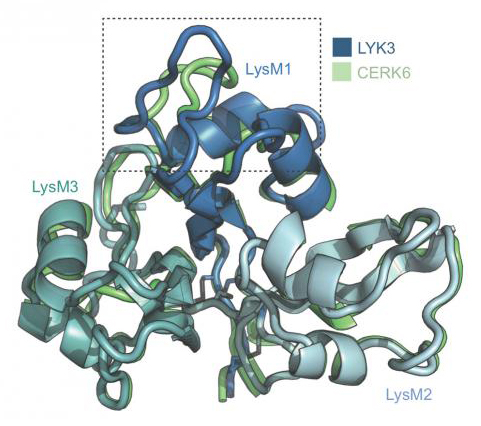Top 5 science result in 2020: Signal molecules are the key to less use of fertilisers
Results published in <em>Science </em> from Aarhus University describe how legumes pick up special signalling molecules to distinguish between harmful and beneficial microbes. These results have been nominated by the Danish technical news journal “Ingeniøren” (the Engineer) as being among the five most important results in Denmark in 2020.

In August 2020, Associate Professor Simona Radutoiu, Assistant Professor Kasper Røjkjær Andersen and Professor Jens Stougaard from the Plant Molecular Biology section at the Department of Molecular Biology and Genetics, Aarhus University, published an article in the international journal Science describing how legumes pick up special signal molecules to distinguish between harmful and beneficial microbes. The results presented in this article have been nominated by “Ingeniøren” as being among the five most important results in Denmark in 2020.
It is important to be able to distinguish between microbes that are harmful and beneficial as they produce similar chitin-based signaling molecules. Some beneficial bacteria can take up nitrogen gas from the air and convert it into a biologically active form. Nitrogen is one of the most important plant nutrients, and therefore it is applied in large quantities as fertiliser to agricultural crops.
However, some plants can recognise the signal molecules from these beneficial microbes, and thus the plant does not need a fertiliser. This applies to, for example, the legume Lotus japonicus, which the research group from Aarhus has studied for many years. This plant has symbiosis with soil bacteria (rhizobia) that penetrate into the roots of the legume, where it forms bacterial nodules. In symbiosis, the bacterium receives carbohydrates from the plant, and the bacterium supplies fixed nitrogen to the plant, and it therefore does not need an artificial fertiliser.
If you can transfer this property to agricultural crops, you will be able to limit the use of artificial fertilisers, which is precisely the long-term goal for the Plant Molecular Biology group at Aarhus University.
Read more about the research results in Science
Every year, “Ingeniøren” nominates the best research results in natural sciences and technical sciences obtained by researchers in Denmark, or where researchers from Denmark have made a significant contribution as part of an international collaboration. Read about “Ingeniøren”’s nomination of the research results for the Top-5 (in Danish)
For further information, please contact
Associate Professor Simona Radutoiu - radutoiu@mbg.au.dk
Assistant Professor Kasper Røjkjær Andersen - kra@mbg.au.dk
Professor Jens Stougaard - stougaard@mbg.au.dk - +4560202649
Department of Molecular Biology and Genetics
Aarhus University, Denmark
